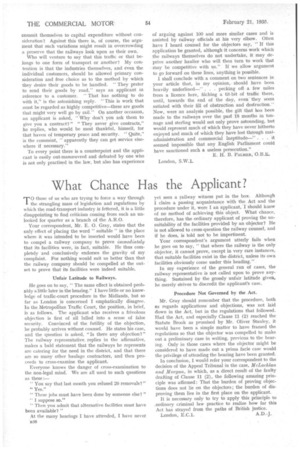What Chance Has the Applicant?
Page 52

If you've noticed an error in this article please click here to report it so we can fix it.
T0 those of us who are trying to force a way through the strangling mass of legislation and regulations by which the road-transport industry is fettered, it is a little disappointing to find criticism coming from such an unlooked for quarter as a branch of the A.R.O.
Your correspondent, Mr. E. 0. Gray, states that the only effect of placing the word " suitable " in the place where it was intended to be inserted would have been to compel a railway company to prove immediately that its facilities. were, in fact, suitable. He thus completely and conclusively endorses the gravity of my. complaint. For nothing would suit us better than that the railway company should be compelled at the outset to prove that its facilities were indeed suitable.
Unfair Latitude to Railways.
He goes on to say, "The same effect is obtained probably a little later in the hearing." I have little or no knowledge of traffic-court procedure in the Midlands, but so far as London is concerned I emphatically disagree. In the Metropolitan Traffic Court, the position, in brief, is as follows. The applicant who receives a frivolous objection is first of all lulled into a sense of false security. Convinced of the futility of the objection, he probably arrives without counsel. He states his case, and the question is asked, "Is there any objection?" The railway representative, replies in the affirmative, makes a bald statement that the railways he represents are catering for the need in the district, and that there are so many other haulage contractors, and then proceeds to cross-examine the applicant.
Everyone knows the danger of cross-examination to the non-legal mind. We are all used to such questions as these :— "You say that last month you refused 20 removals?" " Yes."
"These jobs must have been done by someone else?" " I suppose so."
Then you admit that alternative facilities must have been available?"
At the many hearings I have attended, I have never, B38 yet seen a railway witness put in the box. Although 1 claim a passing acquaintance with the Act and the procedure under it, were I an applicant, I should know of no method of achieving this object. What chance, therefore, has the ordinary applicant of proving the unsuitability of the facilities provided by an objector? He is not allowed to cross-question the railway counsel, and if he does, is told not to be impertinent.
Your correspondent's argument utterly fails when he goes on to say, "that where the railway is the only objector, it cannot prove, except in very rare instances, that suitable facilities exist in the district, unless its own facilities obviously come under this heading."
In my experience of the general run of cases, the railway representative is not called upon to prove anything. Sustained by the grossly unfair latitude given, he merely strives to discredit the applicant's case.
Procedure Not Governed by the Act.
Mr. Gray should remember that the procedure, both as regards applications and objections, was not laid down in the Act, but in the regulations that followed. Had the Act, and especially Clause 11 (2) reached the Statute Brook as promised by Mr. Oliver Stanley, it would have been a simple matter to have framed the regulations so that the objector was compelled to make out a preliminary case in writing, previous to the hearing. Only in those cases where the objector might be considered to have made out a prima facie case would the privilege of attending the hearing have been granted.
In conclusion, I would refer your correspondent to the decision of the Appeal Tribunal in the case, McLachlan and Morgan, in which, as a direct result of the faulty drafting of Clause 11 (2), the following amazing principle was affirmed: That the burden of proving objections does not lie on the objectors; the burden of disproving them lies in the first place on the applicant.
It is necessary only to try to apply this principle to ordinary criminal law practice to realize how far this Act has strayed from the paths of British justice.
London, E.C.1. A.D.-J.




























































































